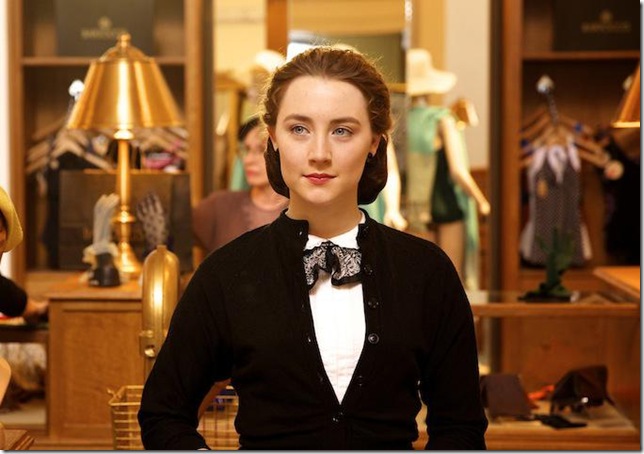On the cusp of the 1950s, sharing a ship with countless other European immigrants en route to the brighter pastures of Ellis Island, Eilis Lacey (Saoirse Ronan) falls ill. Whether it’s from food poisoning or seasickness, the result is the same: a peaked scramble down dank corridors, seeking the relief of a random janitor’s bucket with which to dispense of the material flowing, so to speak, out of both ends.
Later, when she’s safely cloistered in the Irish community that’s settled in New York’s title borough, Eilis performs her Catholic duty by serving a holiday dinner for the homeless — a stream of soot-faced middle-aged men in long woolen coats who built Brooklyn’s infrastructure until the work dried up. One of them stands, mid-meal, and sings a breathtaking Gaelic ballad, its echoes resonating across the walls, just as they will the auditorium of any theater screening Brooklyn, leaving behind a haunting residue of a bygone time and place.
I mention these two scenes because, while their tones couldn’t be more opposing —one is embarrassingly forthright, the other staggeringly beautiful — both serve as disruptions from the calcified conventionality that better defines this period drama. There’s an unguarded naturalism in both moments that just about bursts off the screen, when for a few frames this production loses itself in the emotions. Then we’re back to calibrated calculations and painterly precision. Everything proceeds just so, in a proudly traditional narrative architecture with nary a brick out of place.
Most viewers — and critics, too, judging by the effusive praise the film’s Certified Freshness on Rotten Tomatoes suggests — won’t have a problem with this, and it’s certainly better than the alternative: If most movies’ chief problem was a surplus of perfection, we’d have a much stronger film industry.
And Brooklyn is not without its considerable charms. Adapted by Nick Hornby from Irish author Colm Tóibín’s award-winning 2009 novel, and often suggesting a less-gentrified Jane Austen romance, it follows Eilis from her workaday drudgery in 1950s Ireland and across the inclement waters of the Atlantic, toward a more glamorous, if equally unsatisfying, employ in a Brooklyn department store. Tethering herself to the city’s Irish community, she still manages to meet Tony (Emory Cohen), a working-class Italian-American plumber with a penchant for fair-haired Irish lasses.
They form a connection that becomes something more, until a sudden death in Eilis’ family brings her back home to the rolling hills, placid beaches and unexpected comforts of Ireland. Torn between her native land and her adopted second life, Eilis is forced to make a decision that will dictate her future.
Director John Crowley’s cast is unimpeachably period-perfect. Ronan’s fragile radiance ensures that she’s more than a coming-of-age composite, and you can see the past, present and potential futures flickering across her gaze in every windswept close-up. Cohen, likewise, is an astonishing discovery, a performer who disarms us in the affectless manner of a young Brando or De Niro.
But even formidable actors can’t fully realize some of Hornby’s (and, one assumes, Tóibín’s) wobbly, central-casting supporting characters, including Julie Walters as the lovable curmudgeon who runs the boarding house where Eilis lodges, and child actor James DiGiacomo as Tony’s preternaturally bright 8-year-old brother, who can always be counted on for a sitcommy bon mot.
Crowley’s direction, with the notable exceptions that began this review, tames any wildness that might emerge from this old-fashioned story of self-determination. Even the film’s lone sex scene proceeds with the same sanitized conservatism that keeps this movie so frustratingly straight-and-narrow.
Yet the timing of Brooklyn’s release feels right. In a campaign season dictated more by fear and loathing than compassion, immigration has emerged as arguably the chief concern among policymakers and presidential aspirants. It’s a pretty corny moment when Crowley visualizes a flood of heavenly light spilling from the big blue door separating Ellis Island’s immigration station from the hope and promise of America: It’s an all-too-literal golden door. But maybe we need a little reminding that this country was, and still can be, a beacon of hope.
BROOKLYN. Director: John Crowley; Cast: Saoirse Ronan, Emory Cohen, Domhnall Gleeson, Jim Broadbent, Julie Walters; Distributor: Fox Searchlight; Rating: PG-13; Opens: Today at most area theaters
